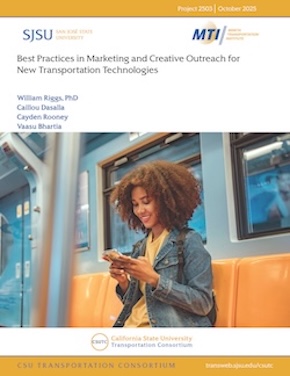- 408-924-7560
- mineta-institute@sjsu.edu
- Donate
Best Practices in Marketing and Creative Outreach for New Transportation Technologies
Emerging transportation technologies—including electric vehicles (EVs), micromobility solutions, autonomous vehicles (AVs), hyperloop systems, and mobility-as-a-service (MaaS) platforms—are rapidly reshaping mobility patterns and urban environments. As these innovations gain traction, it becomes increasingly important to address concerns, communicate advantages, and foster trust across communities. This project examines marketing best practices for promoting emerging mobility solutions, synthesizing insights from scholarly research, industry standards, and case studies of successful campaigns. Emphasis is placed on the shift toward “snackable,” visually engaging content delivered through widely used social media platforms such as TikTok, Instagram, and Snapchat, which are increasingly central to reaching diverse audiences. The analysis demonstrates how innovative outreach methods, beyond conventional branding and media tactics, can foster trust, increase awareness, and engage stakeholders. To ground these findings in practice, the project concludes with the development of six original media projects designed to communicate the benefits, challenges, and societal implications of autonomous vehicles and other advanced transportation technologies. The results offer insights about the process of creating messaging specifically around high tech forms of new transportation such automated and autonomous vehicle transportation. This information can inform AV experts, policymakers, and community leaders to help them develop campaigns and resources that resonate with a wider range of stakeholders to advance technological adoption and increase public confidence.
William Riggs
William Riggs, PhD, AICP, LEED AP is a professor at the University of San Francisco and Director of the Autonomous Vehicles & the City Initiative. A global expert on urban technology, future mobility, and sustainable design, he is driven by a vision to shape the built environment for good. His work bridges academia, government, and industry, spanning autonomous vehicle research with Waymo and Cruise, sustainable community planning with at the Coast Guard, UC Berkeley and ARUP, and large-scale mobility projects across Europe. Riggs has authored more than 100 publications and three books, including End of the Road: Reimagining the Street as the Heart of the City. His research and commentary have been featured in The Economist, Wall Street Journal, The New York Times, PBS, and others. Alongside his academic role, he advises startups, funds, and design ventures focused on ESG and sustainable infrastructure, and he is the founder of the blockchain community development non-profit SFLuv and sits on the Transportation Research Board Committee on Roadside Landscape and Environmental Design, Operations and Maintenance.
Caillou Dasalla
Caillou Dasalla is a masters candidate in Urban & Public Affairs at the University of San Francisco. His academic focus is on California state legislative and fiscal structures, with particular interest in the state budget. His forthcoming thesis examines the avenues, depth, and implications of fiscal literacy among California legislative staff, especially in the context of the state’s recent history of citizen initiative-making. Beyond Urban & Public Affairs, Dasalla is a working librarian with deeply held concern for 21st century media literacy. These broader interests in responsible technology use and adaptation underpin his work as a research assistant for the Autonomous Vehicles & the City Initiative at USFCA.
Cayden Rooney
Cayden Rooney is a Research Assistant at the University of San Francisco, where he studies Business Analytics with minors in Economics and Music. His research work under Professor William Riggs focuses on transportation technologies such as autonomous vehicles, including work with the Autonomous Vehicles and the City Initiative. He is particularly interested in the intersection of data science and technology in shaping the future of mobility and sustainable cities. Most recently, Cayden is working on building AI tools for urban planning solutions at Urban Innovate, and is also on the board at the SFAI club at the University of San Francisco.
Vaasu Bhartia
Vaasu Bhartia is a technology entrepreneur and researcher passionate about leveraging artificial intelligence and data-driven solutions to address real-world challenges. He is the Founder of Saki AI, a startup building innovative approaches to information access and sales. Previously, Vaasu led growth and strategy at Gleen, scaling its pipeline from zero to $500K in under six months, and at Electron, where he contributed to B2B expansion and operational automation. Beyond startups, he has held leadership roles at the Harvard Project for Asian and International Relations (HPAIR), where he negotiated major sponsorships and built global partnerships, and conducted research with NASA, developing prototypes and publishing work on space waste management systems. He has also founded ventures such as Gift a Melody and DCode International, reflecting his interest in combining creativity, education, and technology. Vaasu holds a Master’s in Entrepreneurship and Innovation from the University of San Francisco and a Bachelor’s in Computer Science (AI & ML) from Delhi University. global collaboration.
AV Safety Video
AV Future Video
Explaining AV to a Child
Using the Example of Tesla FSD
Focused on AV Mistakes
Hit the Road" 50 Years in the Future (2075)
-
Contact Us
San José State University One Washington Square, San Jose, CA 95192 Phone: 408-924-7560 Email: mineta-institute@sjsu.edu






